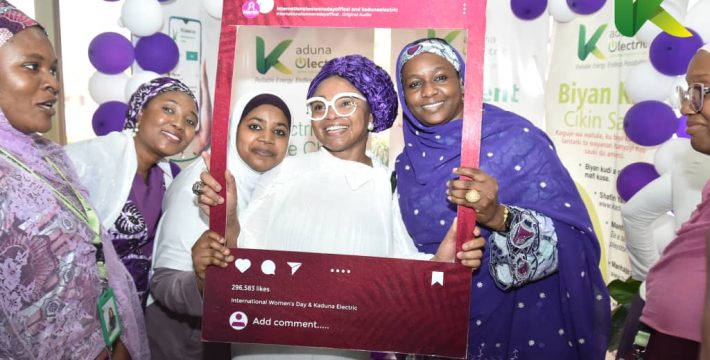
Good day, my fellow women and advocates for gender equality and inclusion. I am deeply honoured to address you on this annual special occasion of International Women’s Day, and even more grateful that I am doing so as the first female board chairperson of any electricity distribution Company in Nigeria. This stride which is collectively ours as women is a powerful reminder of the progress we are making and the work that still lies ahead in achieving gender parity in our sector and our country at large.
Talking about gender inequality in a more focused light among the country’s regions, in northern Nigeria, women face severe challenges throughout their lifetimes. These challenges are caused by entrenched socio-cultural norms that promote and perpetuate gender disparities which always leave women the most disadvantaged. These socio-cultural norms often limit women’s access to education, healthcare, employment, income, economic opportunities, political representation, and decision-making roles. As we gather here today, it is crucial to recognize and address these barriers that hinder the full participation of women in all aspects of society.
For example, in Kaduna Electric, the total percentage of female workers in the company is about 14%, which is relatively low when you compare it to the percentage of male workers at 86%. As you break this number down into the functional units, technical staff comprise of only 1% of female staff which represents 11 women, compared to 99% male technical staff. And across other units, the percentage of women range from 13% to 38%, as opposed to the percent of men ranging from 62% to 87%. These and many other similar disparities occur in our society and are fuelled by inadequate education for the girl child, lack of mentorship, financial limitations, unequal opportunities for women, among other factors.
The theme for this year’s International Women’s Day is “Invest in Women: Accelerate Progress”, while the campaign theme is “Inspire Inclusion”. This theme highlights the importance of believing in women and supporting them in society to drive positive change. This theme also resonates deeply with me as I reflect on my journey as a female leader in the power sector starting in year 2000 as a Corper. I firmly believe that by investing in women’s empowerment, we not only uplift individuals but also transform communities and societies at large.
However, I would like to add that there is one other factor that is often overlooked but is just as important as the spirit of communal support. And that is the spirit of individual resilience. As a woman in this world, people will more likely be drawn to believe in you as much as you believe in yourself, people will invest in you as much as you invest in yourself, and they will support you only as much as you support yourself. This is why it is very important for us as women to overcome our fears and limitations first, before we try to overcome the fears and limitations the society may try to impose on us.
I would like to draw our attention to some remarkable women from northern Nigeria who have shattered barriers and become beacons of resilience and empowerment for women across the world. One of such women is Kaduna’s very own Amina Mohammed. Amina schooled in Kaduna and served as Nigeria’s Minister of Environment from 2015 to 2016. She is currently the Deputy Secretary-General of the United Nations and Chair of the UN’s Sustainable Development Group, where she continues to advocate for sustainable environmental practices. Amina’s leadership and advocacy for sustainable development have not only brought recognition to Nigeria but have also inspired countless women to pursue careers in diplomacy and international relations.
Habiba Ali is a renowned daughter of Kaduna state. She is the founder and CEO of Sosai Renewable Energies Company. Over the years, Habiba has dedicated herself and her company to develop cleaner energy solutions, particularly benefiting women within and beyond Kaduna state. And as such she has established her position as one of the most innovative and prominent women in the African renewable energy space.
Another admirable woman from the North is Hadiza Bala Usman. We both worked in the Bureau of Public Enterprises years ago, after which she was hired in 2004 by the UNDP as Assistant to the Minister of FCT at the time on project implementation. Her commendable impact on these positions resulted in her appointment as the Chief of Staff to the Executive Governor of Kaduna State in 2015, making her the first female to be so appointed in this part of the country. In 2016, she again became the first female Managing Director of Nigerian Port Authority (NPA) in its 63 years of existence. Today Hadiza Bala Usman is the Special Adviser to the President on Policy Coordination and Head, Central Delivery and Coordination Unit, which is a very powerful position given the mandate she has, to assess the performance of the Cabinet Ministers.
So, as we celebrate these trailblazers and countless other unsung heroines, let us recommit ourselves to dismantling barriers and creating a more inclusive society where every woman has the opportunity to thrive and be the best that they can be. Education, economic empowerment, and gender-sensitive policies are essential tools in our quest for gender equality, and we can make changes in our homes, in our circles, business, company, and ultimately the society at large will be better-off. Consequently, as part of our DisCo’s efforts to invest in women and accelerate progress, we will reward the best performing senior student in an all-girls school in Kaduna with the sum of ₦100,000, courtesy of our distinguished MD, Mr Umar Hashidu. On that account I also pledge the same sum to reward a second girl-child in an all-female school that will be identified.
These sort of incentives and efforts including mentorship and the provision of equal opportunities will equip more young women to overcome the socio-cultural barriers that prevent them from reaching their full potential educationally, professionally, and across all other facets of life.
In closing, I urge each one of us to stand together in solidarity and support one another on this journey towards a more equitable future. Let us amplify the voices of women, celebrate their achievements, and work tirelessly to create a world where gender equality is not just a dream but a reality for all. Women most certainly deserve equality in every aspect of life; with reference to a quote by Richie Norton, we deserve a circle of inclusion and influence, but it is up to you and I to create it! This is not just speaking to women but also the men in our mist, lets decisively and consciously inspire inclusion in every way possible. Yes, we can, and I believe we will!
Thank you for your attention, and happy International Women’s Day!

